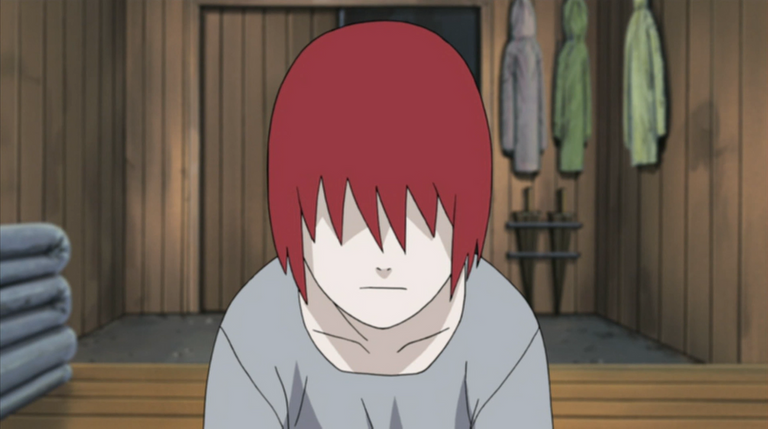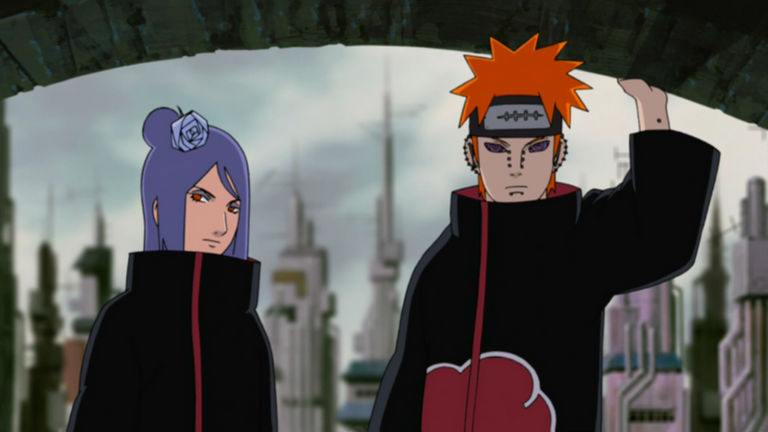[ENG - FR] NARUTO SHIPPUDEN : PAIN
[ENG]
There are characters that remain bound in the soul of each of us. Protagonists, mostly, who, thanks to their immense powers, their limitless abilities, their skills, become the creators of great and epic feats. The superhero universe has accustomed our everyday life to these scenarios, prompting us, more often than not, to root for those who would later become our all-time favourites.
But it has been many years since Western culture, thanks mainly to generational evolution, has brought into its world all those protagonists who are now counted among the Olympus of heroes. From the days of Hokuto Ken to Goku, adolescents first and adults later have always framed these products of fantasy as true myths, creating a cult that has ended up making them true icons.
Anyone of us, at least once in our lives, has dreamed of doing a Goshi Retsu Dan or throwing a Kamehameha. We grew up with these heroes devoted entirely to good, to the defence of humanity, despite the fact that their cosmic powers were capable of destroying the entire world.
Western culture itself (accomplice, perhaps, to that generational change) has begun to wink at the so-called villain. And so it is, in fact, that among the various fans it is Vegeta who has gained notoriety and importance, re-evaluating, positively, his figure and his importance in the Dragonball universe.
These villains evolve through the good that once did not belong to them, taking a path of true redemption.
Pain: History and Background
The character of Pain is placed within the Naruto universe, written and drawn by Masashi Kishimoto. He is, along with the few protagonists of the manga/anime, one of the most powerful. Wanting to give an overview of his life, it is only fair to start with one aspect: Pain's life is deeply intertwined with the entire story of Naruto. But let us proceed in order, since there are several aspects to be pointed out around this character.
First of all: his real name is Nagato Uzumaki.
We learn about this character already during episode 128 of the Naruto Shippuden series (episode 372 if we look at the manga). He was orphaned of both parents during the terrifying Third Great Ninja War, a sad fate common to the many who, like him, resided within the Rain Village, the theatre of war most torn apart by the conflict.
From an early age he met and grew up with two friends, who were also orphans: Yahiko and Konan. The three tried to survive as best they could, coping with the poverty that war tends to produce with its devastation. Poverty that an initially neutral village had never wanted. However, one day, they are found in the cold and perpetual rain, by one of the three legendary ninjas of the Leaf Village: Jiraya. They are raised and trained by the latter, with the sole purpose of living in an increasingly difficult world.
Right from the start, Master Jiraya noticed an important peculiarity: Nagato was possessed of the Rinnegan, the most powerful ocular technique, belonging to the Hermit of the Six Ways. Yet despite its immense power, Nagato did not seem to suffer from the strength and weight of that eye. On the contrary, thanks to it he improved his skills more and more, using them for the good of his companions and not feeling any different or inferior.
Having grown up, Jiraya decided to leave them to their fate. Nagato and his comrades, drawing on terrifying personal experiences, decide to found an organisation, whose main goal was to bring peace to the world, without the use of violence...
Pain: the weight of the overman
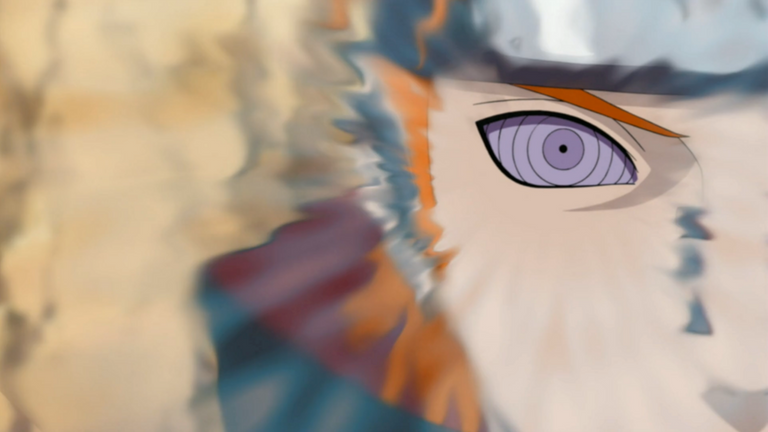
But it is known. Man never learns, not even within a fantasy world like Naruto. Hanzo, the fearsome leader of the Village of Rain, together with Danzo Shimura, one of the "senators" of Konoha and arch-enemy of Hiruzen Sarutobi, fearful of the enormous consensus the organisation was gaining and, moreover, worried about a possible coup by the latter, kidnaps Konan.
Brought to her knees by the slimy gesture, Yahiko, in order to save her companion's life and the Akatsuki's plans, decides to make an extreme gesture: to commit suicide. And she does so by throwing herself on the kunai that Nagato was holding in his hands at that moment, embracing it, in a moving scene, as a last gesture.
A scream. Thus Nagato tears the silence that had been created after the death of his comrade and the teachings of hope and humanity that Master Jiraya had left him give way to the blind fury of hatred and revenge. Now deprived of his heart, he takes possession of Akatsuki, kills Hanzo and his allies and becomes the new leader of the Village of Rain. Pain is born.
In the second part of the manga, Nagato, harnessing the power of the Rinnegan and using the bodies of six deceased people, including Yahiko's, to operate the five types of chakra that only that powerful eye can bestow, begins to work on his plan: to capture the Nine Carrier Forces and use them to bring pain to the whole world, the only viable way to end the eternal conflicts.
Pain: the pain that transcends
We are nothing more than ordinary human beings who seek revenge in the name of what they call justice. But if we accept vengeance as justice, then we must expect that such justice will inevitably generate new vengeance. And this is the beginning of a new circle of hatred.
Many times we have insisted on the notion that Naruto is not a trivial and simple entertainment manga. Theories that find their confirmation when we look at the series in its entire depth, since it draws on important philosophical thoughts, which, in turn, fully fit the ideas expressed by the various characters.
Pain. What would appear to be a simple antagonist, one of many that Naruto has to face, actually conceals a mosaic of thoughts. All this gradually emerges, showing us viewers a true path as only Naruto has accustomed us to. He presents himself as a cold, cynical, calculating being, impassive before the world. He is the head of the Akatsuki, a criminal organisation whose aim is to dominate the world. In short, a familiar plot.
However, one question may be asked: is it really so? Is Pain the classic Lord Frieza who destroys for his own pleasure?
And yet, behind those Rinnegans, those chakra bars scattered all over his body; behind the heartbroken, sad, apathetic face, weary from numerous sufferings, lies a person who as a child, despite the horrors, always nurtured a sensitivity, a shyness and affection towards others. Those Rinnegans saw a light in the pitch blackness of humanity. So how does one become Pain?
Nagato accomplishes a linear process. What he embodies, pain, is inherent both in man and within every creature. Everything is pain. Everything is suffering. It is a condition that prescinds within humanity. For Pain, we are destined to suffer because our desires are devoted to dissatisfaction and to being offended by evils. He sees his family, his village and his friends die. Pain moulds him and realises that it is important not only because it is in the world, but is the very Principle on which the world depends.
Pain takes the very concept of pain to the extreme. He understands that only through universal suffering is the whole of humanity destined to educate itself. Man is self-sacrificing. Every aspect of his soul is doomed to perish in a chain of frustrations. Pain constitutes the profound law of life. What distinguishes human cases and situations is only the different ways and forces in which it manifests itself.
Paradoxically, Pain sees pain as the only way to educate. He is a self-proclaimed spokesman for this conception, since the whole world must suffer in order to understand its true importance and essence. Pain, in doing so, ascends. In fact, during a dialogue with Master Jiraya, he will say:
Pain has made me grow. Even a naive and childish boy like me was forced to mature through suffering. In the end, pain dominates everything: thoughts and words [...]. Excuse me, but you are and will always remain a man, whereas I, through eternal torment, have become something superior... Believe me, I am no longer a man: I am a divinity. Having reached this level, thoughts and words acquire absolute meaning. At this moment, the world is still growing, it has not yet stabilised, and pain will help it to mature. But to facilitate the process of growth and awareness, the hand of a higher being is needed. The world is now like a child who needs my help to grow well.
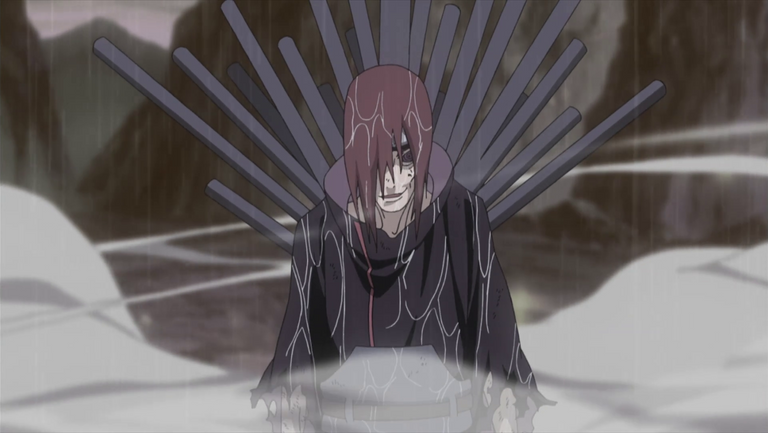
He declares, without mincing words, that he has become a deity. His, however, is no trivial presumption. There is, no doubt, a Nietzschean superhumanistic reinterpretation, whereby he - as a beyond-man rather than a deity - has been able to have accepted his tragic dimension of existence. He has withstood the loss of all certainty and absolute value. He poses himself as a will to power. He proceeds beyond nihilism. He is a man-beyond-man, who searches from the outside for his own destiny and the meaning of the world, capable of creating new values, relating to reality in an unprecedented way.
Having reached this point, a big question can be asked: at what price has Pain become beyond man? There is inherently a rebirth. But this is accompanied by a complete break with one's previous being. An act of courage that allows the destruction in itself of all the past, of history, of traditions, of all the millenary morality that constitutes the old man and world.
Pain: concluding reflections
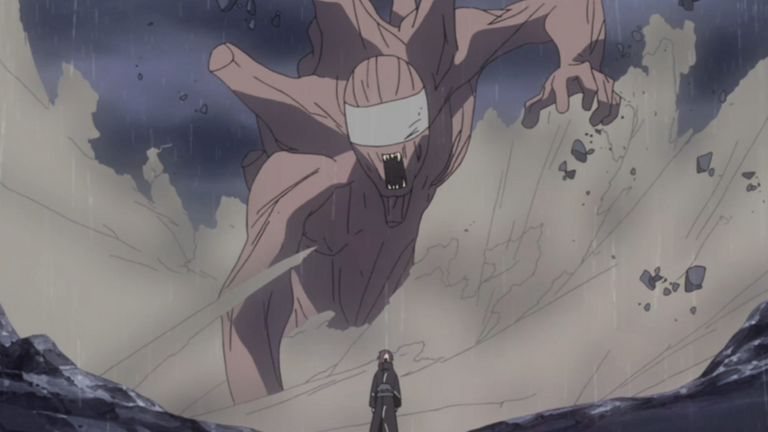
Returning to the manga for a moment, Pain suffered and deliberately decided to suffer. He, in the famous 'Saga of the Master's Prophecy and Vengeance', will have a confrontation with Master Jiraya. The one to perish, unfortunately, will be the legendary ninja himself, who will remain in disbelief at his power, now aware that he has completely lost that shy and serene boy of yesteryear.
Pain, moreover, will go so far as to make a further extreme gesture: to raze Konoha to the ground using the Shinra Tensei, an ability capable of using the force of gravity. This will undoubtedly lead him to a clash against Naruto, who, however, will resort to both the power of the Hermit and (in part) the power of the Nine-Tails Fox to defeat him. And it is here that everything suddenly changes.
In a dialogue with Naruto, Nagato, reduced to exhaustion, recounts his life. Naruto remains impassive, helpless before his words spoken with such suffering and anger.
Yet, inside that stronghold of hatred, Nagato realises that he is a human like everyone else. He begins to review his past. He penetrates his memories and his consciousness, thanks in part to the stinging answers Naruto himself gives him.
Our hearts can bleed, feel the pain Pain has suffered. But this must be declined and turned into real hope, guaranteeing the next person a pain-free existence. Pain, in fact, gives his life and puts his whole self in that blond boy because, although he too has suffered, he believes that pain can serve as catharsis to save the world. And guarantee that peace he so longed for.
The most precious memories are all that must help us to live life and the whole of existence.
Even to face the most atrocious dangers and suffering, without giving in to the black abyss of hatred. This is all that Naruto teaches us. This is all that Pain conveys to us.
[FR]
Il y a des personnages qui restent liés à l'âme de chacun d'entre nous. Des protagonistes, le plus souvent, qui, grâce à leurs immenses pouvoirs, leurs capacités sans limites, leurs compétences, deviennent les créateurs de grands exploits épiques. L'univers des super-héros a habitué notre quotidien à ces scénarios, nous incitant, le plus souvent, à soutenir ceux qui deviendront plus tard nos préférés.
Mais cela fait de nombreuses années que la culture occidentale, grâce notamment à l'évolution des générations, a fait entrer dans son univers tous ces protagonistes qui comptent aujourd'hui parmi les Olympiens des héros. Depuis l'époque de Ken le Survivant jusqu'à Goku, les adolescents d'abord et les adultes ensuite ont toujours considéré ces produits de la fantaisie comme de véritables mythes, créant un culte qui a fini par en faire de véritables icônes.
Chacun d'entre nous, au moins une fois dans sa vie, a rêvé de faire un Goshi Retsu Dan ou de lancer un Kamehameha. Nous avons grandi avec ces héros entièrement dévoués au bien, à la défense de l'humanité, malgré le fait que leurs pouvoirs cosmiques étaient capables de détruire le monde entier.
Pourtant, la même culture occidentale (complice, peut-être, de ce changement générationnel) a commencé à faire un clin d'œil au soi-disant vilain. C'est ainsi, en effet, que parmi les différents fans, c'est Vegeta qui a gagné en notoriété et en importance, réévaluant, de manière positive, sa figure et son importance dans l'univers Dragonball.
Ces méchants évoluent à travers le bien qui ne leur appartenait pas, prenant le chemin d'une véritable rédemption.
Pain : histoire et contexte
Le personnage de Pain fait partie intégrante de l'univers de Naruto, écrit et dessiné par Masashi Kishimoto. Il est, avec les quelques protagonistes du manga/anime, l'un des plus puissants de tous. Si l'on veut donner un aperçu de sa vie, il est juste de commencer par un aspect : la vie de Pain est profondément liée à toute l'histoire de Naruto. Mais procédons dans l'ordre, car il y a plusieurs aspects à souligner autour de ce personnage.
Tout d'abord, son vrai nom est Nagato Uzumaki.
Nous apprenons à connaître ce personnage dès l'épisode 128 de la série Naruto Shippuden (épisode 372 si l'on regarde le manga). Il est devenu orphelin de père et de mère pendant la terrifiante troisième guerre des Ninjas, un triste sort commun à tous ceux qui, comme lui, résidaient dans le village de la pluie, le théâtre de guerre le plus déchiré par le conflit.
Dès son plus jeune âge, il a connu et grandi avec deux amis, eux aussi orphelins : Yahiko et Konan. Tous trois tentent de survivre du mieux qu'ils peuvent, tout en faisant face à la pauvreté que la guerre tend à engendrer avec ses ravages. Une pauvreté dont un village initialement neutre n'avait jamais voulu. Cependant, un jour, ils sont retrouvés dans le froid et la pluie perpétuelle, par l'un des trois ninjas légendaires du Village des Feuilles : Jiraya. Ils sont élevés et formés par ces derniers, dans le seul but de vivre dans un monde de plus en plus difficile.
Dès le début, Maître Jiraya a remarqué une particularité importante : Nagato était en possession du Rinnegan, la plus puissante technique oculaire, appartenant à l'Ermite des Six Voies. Pourtant, malgré son immense puissance, Nagato ne semblait pas souffrir de la force et du poids de cet œil. Au contraire, grâce à elle, il a amélioré ses compétences de plus en plus, les utilisant pour le bien de ses compagnons, sans se sentir différent ou inférieur.
Ayant grandi, Jiraya a décidé de les laisser à leur sort. Nagato et ses camarades, s'appuyant sur des expériences personnelles terrifiantes, décident de fonder une organisation dont le but principal est d'apporter la paix au monde, sans recourir à la violence...
Pain : le poids du surhomme

Mais tu sais. L'homme n'apprend jamais, pas même dans un monde imaginaire comme Naruto. Hanzo, le redoutable leader du Village de la Pluie, ainsi que Danzo Shimura, l'un des "sénateurs" de Konoha et ennemi juré d'Hiruzen Sarutobi, effrayés par l'énorme consensus que l'organisation est en train de gagner et, de plus, inquiets d'un possible coup d'état de ce dernier, enlèvent Konan.
Mis à genoux par ce geste gluant, Yahiko, afin de sauver la vie de son compagnon et les plans de l'Akatsuki, décide de faire un geste extrême : se suicider. Et elle le fait en se jetant sur le kunai que Nagato tenait à ce moment-là dans ses mains, l'embrassant, dans une scène émouvante, comme un dernier geste.
Un cri. Ainsi Nagato déchire le silence qui s'était créé après la mort de son camarade, et les enseignements d'espoir et d'humanité que Maître Jiraya lui avait laissés laissent place à la fureur aveugle de la haine et de la vengeance. Désormais privé de son cœur, il prend possession de l'Akatsuki, tue Hanzo et ses alliés et devient le nouveau chef du Village de la Pluie. Pain est née.
Dans la deuxième partie du manga, Nagato, maîtrisant la puissance du Rinnegan et utilisant les corps de six personnes décédées, dont celui de Yahiko, pour faire fonctionner les cinq types de chakra que seul ce puissant œil peut conférer, commence à travailler sur son plan : capturer les Neuf Forces Porteuses et les utiliser pour faire souffrir le monde entier, seul moyen viable de mettre fin aux conflits éternels.
Pain : la douleur qui transcende
Nous ne sommes rien de plus que des êtres humains ordinaires qui cherchent à se venger au nom de ce qu'ils appellent la justice. Mais si nous acceptons la vengeance comme une justice, alors nous devons nous attendre à ce que cette justice génère inévitablement une nouvelle vengeance. Et c'est le début d'un nouveau cercle de haine.
On a souvent insisté sur le fait que Naruto n'est pas un manga de divertissement banal et simple. Des théories qui trouvent leur confirmation si l'on considère la série dans toute sa profondeur, puisqu'elle s'appuie sur d'importantes pensées philosophiques qui, à leur tour, correspondent parfaitement aux idées exprimées par les différents personnages.
Pain. Ce qui semblerait être un simple antagoniste, un parmi tant d'autres que Naruto doit affronter, cache en fait une mosaïque de pensées. Tout cela émerge progressivement, nous montrant aux spectateurs un véritable chemin comme seul Naruto nous y a habitués. Il se présente comme un être froid, cynique, calculateur, impassible devant le monde. Il est à la tête de l'Akatsuki, une organisation criminelle dont le but est de dominer le monde. En bref, une intrigue familière.
Cependant, une question peut être posée : est-ce vraiment le cas ? Pain est-il le Seigneur Frieza classique qui détruit pour son propre plaisir ?
Et pourtant, derrière ces Rinnegans, ces barres de chakra éparpillées sur tout son corps ; derrière ce visage au cœur brisé, triste, apathique, fatigué par de nombreuses souffrances, se cache une personne qui, enfant, malgré les horreurs, a toujours nourri une sensibilité, une timidité et une affection envers les autres. Ces Rinnegans ont vu une lumière dans le noir complet de l'humanité. Alors comment devient-on Pain?
Nagato accomplit un processus linéaire. Ce qu'il incarne, la douleur, est inhérent à la fois à l'homme et à toute créature. Tout est douleur. Tout est souffrance. C'est une condition qui préside à l'humanité. Pour Pain, nous sommes destinés à souffrir parce que nos désirs sont voués à l'insatisfaction et à être offensés par les maux. Il voit mourir sa famille, son village et ses amis. La douleur le façonne et il comprend qu'elle est importante non seulement parce qu'elle est dans le monde, mais qu'elle est le Principe même dont dépend le monde.
Pain pousse le concept même de la douleur à l'extrême. Il comprend que ce n'est que par la souffrance universelle que l'humanité tout entière est destinée à s'éduquer. L'homme se sacrifie. Chaque aspect de son âme est voué à périr dans une chaîne de frustrations. La douleur constitue la loi profonde de la vie. Ce qui distingue les cas et les situations humaines, ce ne sont que les différentes manières et forces dans lesquelles elle se manifeste.
Paradoxalement, Pain considère la douleur comme le seul moyen d'éduquer. Il se fait le porte-parole autoproclamé de cette conception, puisque le monde entier doit souffrir pour en comprendre la véritable importance et l'essence. En faisant cela, Pain s'élève. En effet, lors d'un dialogue avec Maître Jiraya, il dira :
La douleur m'a fait grandir. Même un garçon naïf et enfantin comme moi a été forcé de mûrir à travers la souffrance. En fin de compte, la douleur domine tout : les pensées et les mots [...]. Excusez-moi, mais vous êtes et resterez toujours un homme, alors que moi, à travers les tourments éternels, je suis devenu quelque chose de supérieur... Croyez-moi, je ne suis plus un homme : je suis une divinité. Ayant atteint ce niveau, les pensées et les mots acquièrent une signification absolue. En ce moment, le monde est encore en croissance, il ne s'est pas encore stabilisé, et la douleur l'aidera à mûrir. Mais pour faciliter le processus de croissance et de prise de conscience, la main d'un être supérieur est nécessaire. Le monde est maintenant comme un enfant qui a besoin de mon aide pour bien grandir.

Il déclare, sans mâcher ses mots, qu'il est devenu une divinité. Il ne s'agit cependant pas d'une vanité banale. Il y a, sans doute, une réinterprétation surhumaine nietzschéenne, par laquelle il a pu - en tant qu'au-delà de l'homme plutôt qu'en tant que divinité - avoir accepté la dimension tragique de son existence. Il a résisté à la perte de toute certitude et de toute valeur absolue. Il se pose comme une volonté de puissance. Il va au-delà du nihilisme. C'est un homme au-delà de l'homme, qui cherche de l'extérieur son propre destin et le sens du monde, capable de créer de nouvelles valeurs, d'entrer en relation avec la réalité d'une manière inédite.
Arrivé à ce point, une grande question doit être posée : à quel prix Pain est-il devenu au-delà de l'homme ? Il y a intrinsèquement une renaissance. Mais cela s'accompagne d'une rupture totale avec son être antérieur. Un acte de courage qui permet la destruction en soi de tout le passé, de l'histoire, des traditions, de toute la morale millénaire qui constitue le vieil homme et le monde.
Pain : réflexions finales

Pour en revenir un instant au manga, Pain a souffert et décide délibérément de souffrir. Ce dernier, dans la fameuse "Saga de la prophétie et de la vengeance du maître", aura une confrontation avec le maître Jiraya. Celui qui périra, malheureusement, sera le légendaire ninja lui-même, qui restera incrédule devant sa puissance, désormais conscient d'avoir complètement perdu le garçon timide et serein d'antan.
Pain ira d'ailleurs jusqu'à accomplir un autre geste extrême : raser Konoha à l'aide du Shinra Tensei, une capacité capable d'utiliser la force de gravité. Cela le mènera sans aucun doute à un affrontement contre Naruto, qui, cependant, aura recours à la fois au pouvoir de l'Hermite et (en partie) au pouvoir du Renard à neuf queues pour le vaincre. Et c'est là que tout change soudainement.
Dans un dialogue avec Naruto, Nagato, réduit à l'épuisement, raconte sa vie. Naruto reste impassible, impuissant devant ses paroles prononcées avec tant de souffrance et de colère.
Pourtant, à l'intérieur de ce bastion de la haine, Nagato réalise qu'il est un humain comme les autres. Il commence à passer en revue son passé. Il pénètre ses souvenirs et sa conscience, en partie grâce aux réponses cinglantes que Naruto lui-même lui donne.
Nos cœurs peuvent saigner, sentir la douleur que Pain a subie. Mais cela doit être décliné et transformé en un véritable espoir, garantissant à la prochaine personne une existence sans douleur. Car Pain donne sa vie et met tout son être dans ce garçon blond parce que, bien que lui aussi ait souffert, il croit que la douleur peut servir de catharsis pour sauver le monde. Et garantir cette paix à laquelle il aspirait tant.
Les souvenirs les plus précieux sont tout ce qui doit nous aider à vivre la vie et l'ensemble de l'existence.
Même pour affronter les dangers et les souffrances les plus atroces, sans céder à l'abîme noir de la haine. C'est tout ce que Naruto nous apprend. C'est tout ce que Pain nous transmet.
